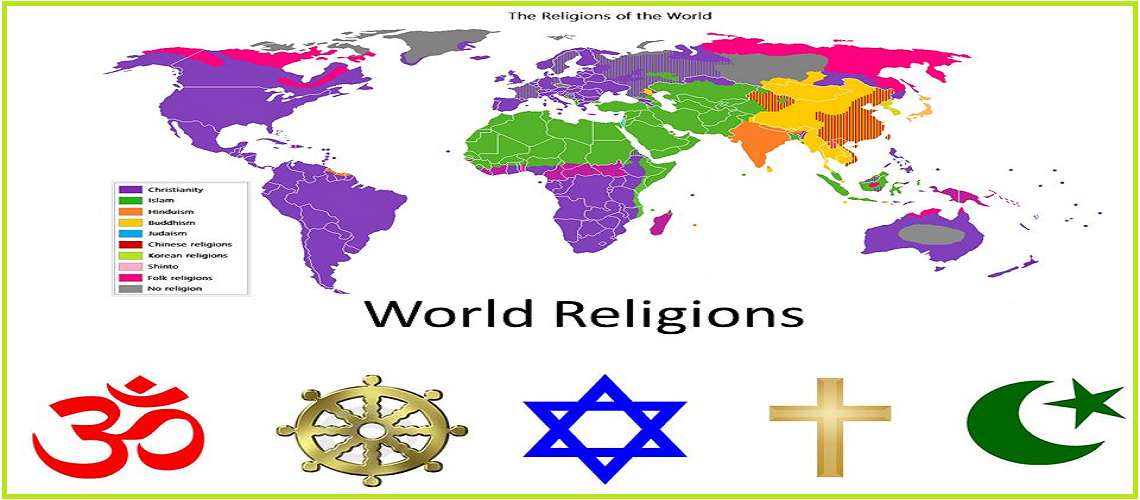In many parts of the world, people once lived their entire lives without even meeting a follower of another religion. Today, globalization, fueled by migration, politics, economics, and the Internet, has brought awareness of other faiths to most of earth’s population. Understanding the “global village” is impossible without some grasp of the religious beliefs that shape people’s behaviors, attitudes, and actions.
Religion is called a cultural universal because it is found in all human societies. Even secular anthropologists acknowledge that no culture has yet been found that does not have some form of religion. This universality suggests that knowing something about this topic is crucial to comprehending humanity. Even though the nonreligious today number in the hundreds of millions, the vast majority professes belonging to some form of religious system. To fathom the why of what people do and say, again, one must understand the religious beliefs that shape their worldviews.
The variety of belief and practice on the globe now is astounding. The frequently heard statement “All religions are basically the same” is based on the superficial observation that religion seems to be about guiding and motivating people to “behave well.” However, no one who has learned what adherents to the various religions actually believe and practice would make such a comment. There isn’t even common ground in another common misconception: “All religions are just different paths to God.” Religious belief is as much about the nature of God (or gods, goddesses, spirits, or other powers) as it is about how to reach or interact with this deity. In fact, many religions aren’t trying to reach any deity at all.
Again, there is significant variety within each of the world’s religions. Christianity has many denominations (with new ones springing up every year), and it is by no means unique in having multiple groups, often with significant disparities in belief and practice. For example, just knowing that a person is a Buddhist tells you relatively little about what he believes, as Buddhism has three major divisions, each with multiple and significantly different subgroups.
Further, international politics today is impossible to understand without some knowledge of religion. Friction between countries develops because governments make decisions without considering the religious beliefs of other nations. News media and foreign policy experts try to explain terrorism without knowing or grasping the religious beliefs of those involved (and founding or supporting terroristic groups is not limited to one religion). We may support one side or the other in the Israeli-Palestinian conflict because of assumptions about religion. To be sure, religion is not the only factor impacting global political events, but it is a big one. In most of the world, people don’t dichotomize the sacred and the secular as we commonly do in the West, so elsewhere religious considerations are much more at the forefront of people’s minds in assessing political issues.
Also, religion has been the motivation for, and provider of, content for much of the world’s art and music. Imagine, for example, trying to understand Handel’s Messiah with no knowledge of Christianity, or Indian art without a grasp of Hinduism. Ancient dramas and countless more-recent plays and films draw upon themes that require some knowledge of religion to comprehend. Literature of all ages makes reference to religious themes and practices.
Some people’s belief includes a form of “If it’s God’s [or the gods’] will for life to be better, it will get better without our efforts; if it’s not, things won’t improve no matter what we do.” If a society’s religious basis includes a fatalistic worldview, then motivating its people to implement policies and adopt behaviors that would tangibly benefit them can be challenging. In animistic societies, people may fear making changes lest they anger the spirits who can bring disease, crop failures, or other calamities upon the community. We need to understand religious convictions in order to be effective in matters of economics and development.
Migration has brought refugees and new immigrants to communities far from their homelands, affecting not only major cities but smaller rural areas as well. In many cases, these arrivals espouse religions different from those of the communities where they settle. (Two examples involving where I live are the many animistic Hmong making their home in Minnesota and in central California and the Somali Muslims who have settled in Minnesota and Toronto.) Knowing something about their religions is essential to interacting and communicating with them meaningfully.
It isn’t unusual in today’s world to compare the best of one’s own faith to the worst of another. This is neither honest nor respectful. Comparisons must be accurate and must consider the whole of a religion’s teaching and practice. This book endeavors to present each religion in a straightforward way, so that a reader who is a follower while perhaps disagreeing with certain assessments, would say the description is truthful and fair.
An Extra Minute
Followers of different faiths sometimes use the same words but intend very different meanings, which can lead to confusion. For Christians, being “born again” is a positive statement about spiritual life, taken from Jesus’ words in John 3. To Hindus, it implies reincarnation, which they are trying to escape. So when a Christian asks a Hindu about being reborn, the likely response is, “I’ve already been born again and again and again. That’s what I want to get away from.” We need to (1) find out what people actually believe and (2) not assume words mean the same thing in every context.
References:
Morgan, G. R. (2012). Understanding World Religions in 15 Minutes a Day (pp. 17–20). Minneapolis, MN: Bethany House Publishers.







